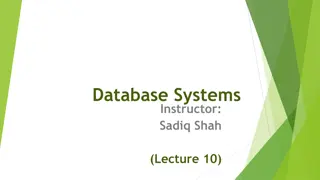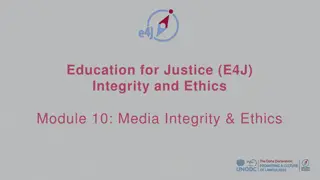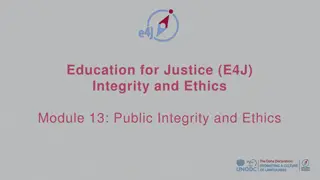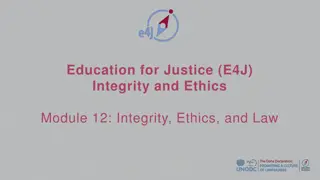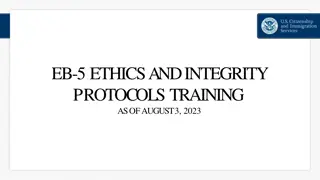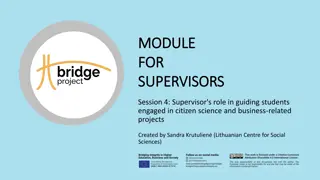Ethics and Integrity Module Overview
This module provides an in-depth exploration of integrity and ethics, covering conceptual frameworks, ethical theories, major philosophers, and practical applications through exercises and discussions. Students will develop an understanding of integrity, ethical dilemmas, and personal values in this comprehensive educational program.
Download Presentation

Please find below an Image/Link to download the presentation.
The content on the website is provided AS IS for your information and personal use only. It may not be sold, licensed, or shared on other websites without obtaining consent from the author.If you encounter any issues during the download, it is possible that the publisher has removed the file from their server.
You are allowed to download the files provided on this website for personal or commercial use, subject to the condition that they are used lawfully. All files are the property of their respective owners.
The content on the website is provided AS IS for your information and personal use only. It may not be sold, licensed, or shared on other websites without obtaining consent from the author.
E N D
Presentation Transcript
Education for Justice (E4J) Integrity and Ethics Module 1: Introduction and Conceptual Framework
Agenda Conceptual analysis of integrity (15 minutes) Conceptual analysis of ethics (10 minutes) Class exercises (30 minutes) Introduction to ethical theories and major ethical philosophers (60 minutes) Discussion of ethical dilemmas in small groups (45 minutes) Plenary discussion and conclusion (20 minutes)
Learning Outcomes Upon completion of this module students should be able to: Understand and define the concepts of integrity and ethics Describe three major theoretical approaches in integrity and ethics Identify ethical dilemmas and apply different theoretical approaches Understand the concept of personal integrity in the context of this module
Conceptual analysis of Integrity Definitions of Integrity Types of integrity o o o o o Self-integration The identity view of integrity The self-constitution view of integrity Integrity as standing for something Integrity as moral purpose
Conceptual analysis of Ethics Western philosophies on ethics and morality: o the attempt to arrive at an understanding of the nature of human values, of how we ought to live, and of what constitutes right conduct. o o the study or the science of morals a sense of right and wrong Non-western ethical concepts: o o The Chinese traditions Confucius approach to ethics
Class exercises (part I) E1: Personal values
Class exercises (part II) E2: Shipwreck Situation E3: Baby Theresa (case study) E4: The Parable of the Sadhu (case study)
Introduction to ethical theories and major ethical philosophers The Role of Theory The World How to understand it How to change it Descriptive theory Ethical theory Action The is The ought
Introduction to ethical theories and major ethical philosophers Core Ethical Theories Utilitarianism Deontology Virtue Morality depends on Consequence s cost / benefit Mill, Bentham Conformity to moral principles Perfecting one s character Key philosophers Kant Aristotle Jargon Greatest Happiness Principle Categorical Imperative Telos 9
Discussion of ethical dilemmas Write down an example of an ethical dilemma that you have faced in your own personal environment (5 minutes) Share your dilemmas in a small group (20 minutes) Each group is invited to share and discuss one example with the whole class (20 minutes)
Core reading Deigh, John (2010). An Introduction to Ethics. Cambridge: Cambridge University Press. An open access version of chapter one of this introductory text is available from http://www.insightsonindia.com/wp- content/uploads/2013/09/what-is-ethics-cambridge-university.pdf Internet Encyclopedia of Philosophy (section on ethics, more specifically subsection on normative ethics). Available from http://www.iep.utm.edu/ethics/#H2 Parry, Richard (2014). Ancient ethical theory. The Stanford Encyclopedia of Philosophy. Edward N. Zalta, ed. Available from https://plato.stanford.edu/archives/fall2014/entries/ethics-ancient/














